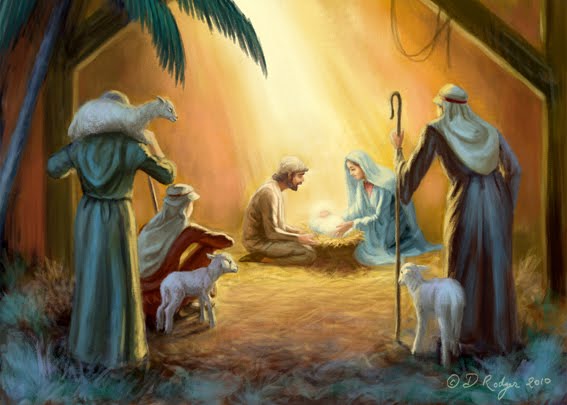John 1: 1-18
In the beginning was the Word, and the Word was with God, and the Word was God. 2He was in the beginning with God. 3All things came into being through him, and without him not one thing came into being. What has come into being 4in him was life, and the life was the light of all people.
5The light shines in the darkness, and the darkness did not overcome it. 6There was a man sent from God, whose name was John. 7He came as a witness to testify to the light, so that all might believe through him. 8He himself was not the light, but he came to testify to the light. 9The true light, which enlightens everyone, was coming into the world. 10He was in the world, and the world came into being through him; yet the world did not know him. 11He came to what was his own, and his own people did not accept him. 12But to all who received him, who believed in his name, he gave power to become children of God, 13who were born, not of blood or of the will of the flesh or of the will of man, but of God. 14And the Word became flesh and lived among us, and we have seen his glory, the glory as of a father’s only son, full of grace and truth.
15(John testified to him and cried out, “This was he of whom I said, ‘He who comes after me ranks ahead of me because he was before me.’”) 16From his fullness we have all received, grace upon grace. 17The law indeed was given through Moses; grace and truth came through Jesus Christ. 18No one has ever seen God. It is God the only Son, who is close to the Father’s heart, who has made him known.
The Light has come! The Dawn is here!
God created Light.
And Light pushed the darkness into the shadows.
Light came and the world looked different, illuminated for the first time.
Light invited us to journey in a different way, to walk with Light.
But we wandered in the darkness, often mistaking shadows for Light.
The darkness sometimes made us afraid so we befriended darkness.
And then darkness taught us that we could see more clearly with Light.
So there, there in the darkness, we began to find Light.
Light began to flicker and shimmer over the waters and the earth and filled our space.
Light was like nothing we had ever known.
Light surrounded us and invited us into itself.
But we held back in the darkness, holding the Light at bay.
So, Light continued to shine into everything, even the dark and jagged corners of our world.
When we were lost, Light looked for us and we were found.
When we were grieving, Light held our hand.
When we were more comfortable in the darkness, Light waited patiently and beckoned us toward itself.
And when we could not find the Light, Light showed us our strength and our faith.
And then, undeterred, Light came, tiptoeing into our world, into even the darkness, without welcome or accolade.
And Light was laid aside.
So, quietly, oh so quietly, Light began to dance, filling the room, filling the world, filling us with Light.
Those who knew darkness suddenly knew Light.
Those who relied on shadows saw the way Light moves through them.
Light played. Light danced. Light shimmered into the shadows of the world.
And Light invited us to join, to play, to dance, to shimmer.
And then we became part of the Light.
And even the darkness was filled with Light.
Light has dawned. And Light asks us to dance—even in our darkness. And we find that we are full of Light.
The Light has come! The Dawn is here! Go and be Light! Merry Christmas! (SW 2021)
When the star in the sky is gone,
When the Kings and Princes are home,
When the shepherds are back with their flocks,
The Work of Christmas begins:
To find the lost,
To heal the broken,
To feed the hungry,
To release the prisoner,
To teach the nations,
To bring Christ to all,
To make music in the heart. (Howard Thurman)
Thank you so much for joining me in this series! I know the world hasn’t dramatically changed while we’ve been reading and thinking and commenting. But I think it’s changed a little. Thank you! Keep waiting on the world to change…and working on it too!
All the Presents have been opened
I’ve been up since early dawn
Sharing calls with friends and family
Dear old Santa’s come and gone
As we gather around the table
Holding hands we bow our heads
I thank the Lord for all of you
And this is what I said
I pray for peace to shine on a world that’s torn apart
I pray for faith to comfort and heal on troubled heart
For hope to restore our spirits, when the hopeless lose their way
May His everlasting Love surround us
This is what I pray
As we celebrate thе season and all the love that wе embrace
I’ll make sure to count my blessings when I see my children’s face
When I think about this Christmas right before I fall asleep
There’s still one thing I’ve to do to make this day complete
I pray for peace to shine on a world that’s torn apart
I pray for faith to comfort and heal on troubled heart
For hope to restore our spirits, when the hopeless lose their way
May His everlasting Love surround us
This is what I pray
I pray for peace to shine on a world that’s torn apart
I pray for faith to comfort and heal on troubled heart
For hope to restore our spirits, when the hopeless lose their way
May His everlasting Love surround us
This is what I pray
May His everlasting Love surround us
This is what I pray
Merry Christmas!
Shelli






